The Role of Legal Reference Letters in Building a Strong Professional Network: 26-Templates
Welcome to the “Legal Reference Letters” website, your go-to resource for all things related to crafting exceptional reference letters. Whether you are an individual seeking a strong recommendation or someone entrusted with the responsibility of writing a reference, this website is designed to provide you with valuable guidance and insights. Our goal is to empower you with the knowledge and tools needed to create persuasive and impactful letters that accurately showcase the skills, qualifications, and accomplishments of the individuals being recommended. Explore our resources, tips, and examples to enhance your letter-writing skills and navigate the process with confidence. Get ready to unlock the potential of compelling reference and elevate your professional and educational endeavors.
Letter Writing Tips
- Introduction: Begin the letter with a professional salutation and a concise introduction that states your relationship with the individual you’re recommending, along with your credentials or qualifications.
- Context and Purpose: Clearly explain the context in which you interacted with the individual, such as their role, responsibilities, and duration of your association. Mention the purpose of the letter, whether it’s for employment, educational pursuits, or other specific objectives.
- Specific Examples: Provide specific examples of the individual’s skills, achievements, and qualities that make them stand out. Use concrete and measurable examples to illustrate their competence, dedication, and impact in their field of work or study.
- Professional Competence: Highlight the individual’s professional competence and expertise in their specific area of law. Discuss their knowledge, analytical skills, research abilities, and their ability to apply legal principles effectively.
- Personal Qualities: Include information about the individual’s personal qualities, such as integrity, ethics, and reliability. Emphasize their ability to maintain confidentiality, work well in teams, and handle high-pressure situations with professionalism.
- Impact and Results: Describe the individual’s contributions and the positive impact they have made in their work or educational setting. Highlight any notable achievements, successful projects, or positive outcomes that demonstrate their capabilities and value.
- Language and Tone: Use professional and objective language throughout the letter. Maintain a positive and supportive tone while avoiding excessive exaggeration or hyperbole. Be honest and genuine in your assessment, providing a balanced perspective.
- Proper Formatting: Ensure that the follows proper formatting guidelines, including a professional letterhead if applicable. Use a clear and readable font, maintain consistent margins, and align the content in a structured and organized manner.
- Proofreading and Editing: Proofread the letter carefully to ensure accuracy, proper grammar, and spelling. Edit for clarity and conciseness, removing any unnecessary or redundant information.
- Contact Information: Conclude with your contact information, inviting the recipient to reach out if they have any further questions or require additional information.
Guidance for Requesters
- Choose appropriate referees: Select individuals who can provide a strong and relevant recommendation based on their knowledge of your skills, abilities, and achievements. Consider professors, supervisors, mentors, or colleagues who can speak to your legal expertise and personal qualities.
- Establish a professional relationship: Build a strong professional relationship with your potential referees. Engage in meaningful interactions, demonstrate your dedication and commitment, and seek opportunities to work closely with them to ensure they have a good understanding of your capabilities.
- Make a compelling request: When asking someone to write a reference letter, be clear and concise about your request. Explain the purpose, provide any relevant details or deadlines, and express your gratitude for their willingness to support you.
- Provide necessary information: Give your referees the necessary information to write a strong reference letter. This may include your resume, transcripts, project reports, or other supporting documents highlighting your achievements, skills, and experiences.
- Communicate your goals and aspirations: Share your career or educational goals with your referees. Help them understand how the reference will contribute to your future endeavors and why their endorsement is important to you.
- Personalize your request: Tailor your request to each referee individually, highlighting specific experiences or interactions that demonstrate why they are well-suited to write a reference letter for you. This personal touch shows that you value their perspective and opinion.
- Offer talking points or specific details: If there are particular areas or accomplishments you want your referees to emphasize, provide them with specific talking points or details. This ensures that the letter addresses the aspects of your qualifications that are most relevant to your goals.
- Follow up and express gratitude: After your referees have written, follow up with a sincere thank-you note expressing your appreciation for their time, effort, and support. Maintaining professional relationships is crucial for future references or collaborations.
#1: Professional Recommendation for a Skilled Lawyer
A professional recommendation letter for a skilled lawyer serves as a powerful tool in showcasing the individual’s qualifications, expertise, and professional accomplishments. This is typically requested by the lawyer’s prospective employer, legal organization, or professional network to gain insights into the lawyer’s capabilities and suitability for a particular position or opportunity. It aims to present a compelling case for why the lawyer is an outstanding candidate and instill confidence in their abilities. A well-crafted recommendation can significantly enhance the lawyer’s chances of securing new opportunities, fostering professional relationships, and advancing their career.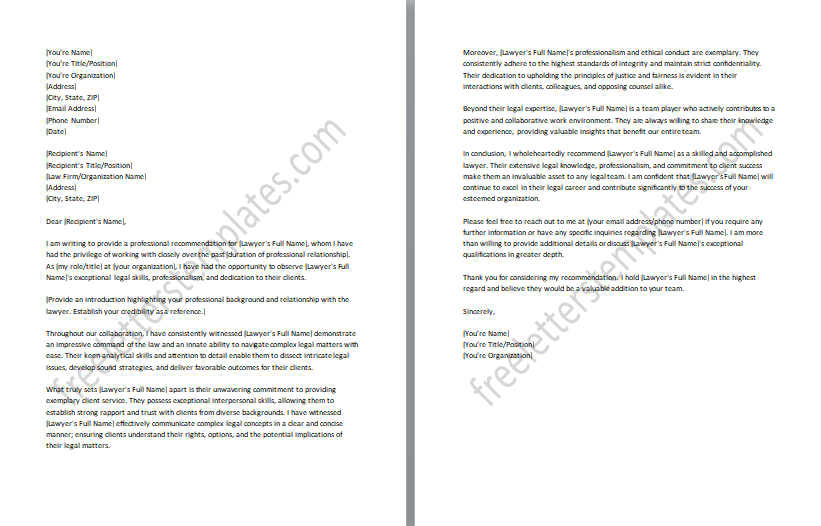
#2: Reference for an Accomplished Paralegal
A reference letter for an accomplished paralegal serves as a valuable endorsement of their skills, experience, and professional achievements. This type is typically requested by the paralegal’s prospective employer, firm, or professional network to assess their qualifications and suitability for a paralegal position or career advancement. It highlights their attention to detail, strong organizational skills, ability to work under pressure, and their contributions to the success of teams or projects. The reference letter aims to convey professionalism, dedication, and commitment to excellence, which are vital qualities in the profession. A well-crafted reference can significantly bolster the paralegal’s chances of securing new employment opportunities, advancing their career, and establishing a positive professional reputation.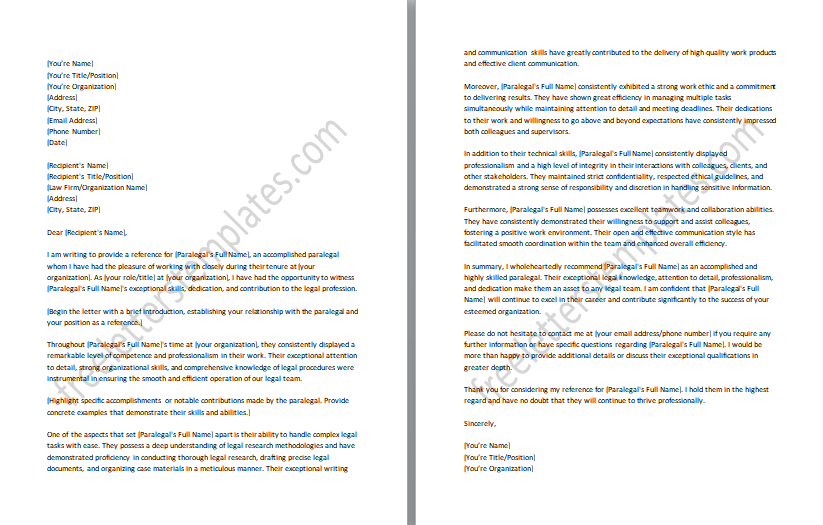
#3: Judicial Reference for a Respected Judge
A judicial reference letter for a respected judge is a testament to their character, integrity, acumen, and contributions to the legal system. It objectively assesses the judge’s judicial expertise, impartiality, fairness, and adherence to ethical standards. The letter highlights their exceptional courtroom demeanor, sound judgment, reasoning abilities, and commitment to upholding the principles of justice. It conveys the judge’s reputation for integrity, significant contributions to the legal profession, and impact on the administration of justice. A well-crafted reference enhances the judge’s standing, contributes to their professional advancement, and reinforces public confidence in their abilities as respected judicial figures.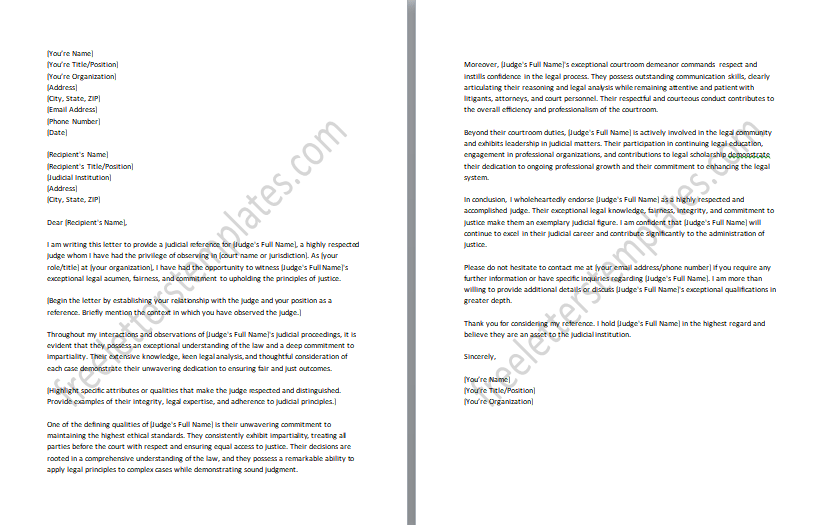
#4: Academic Recommendation for a Law Student
An academic recommendation letter for a law student provides an objective evaluation of their intellectual abilities, work ethic, and potential for success in the field. The letter emphasizes their academic achievements, extracurricular involvement, and leadership potential. It aims to present a compelling case for why the student is an exceptional candidate for further education or career opportunities in law. A well-crafted recommendation enhances the student’s chances of gaining admission to prestigious programs, securing internships, scholarships, or employment, and setting them on a path to a successful legal career.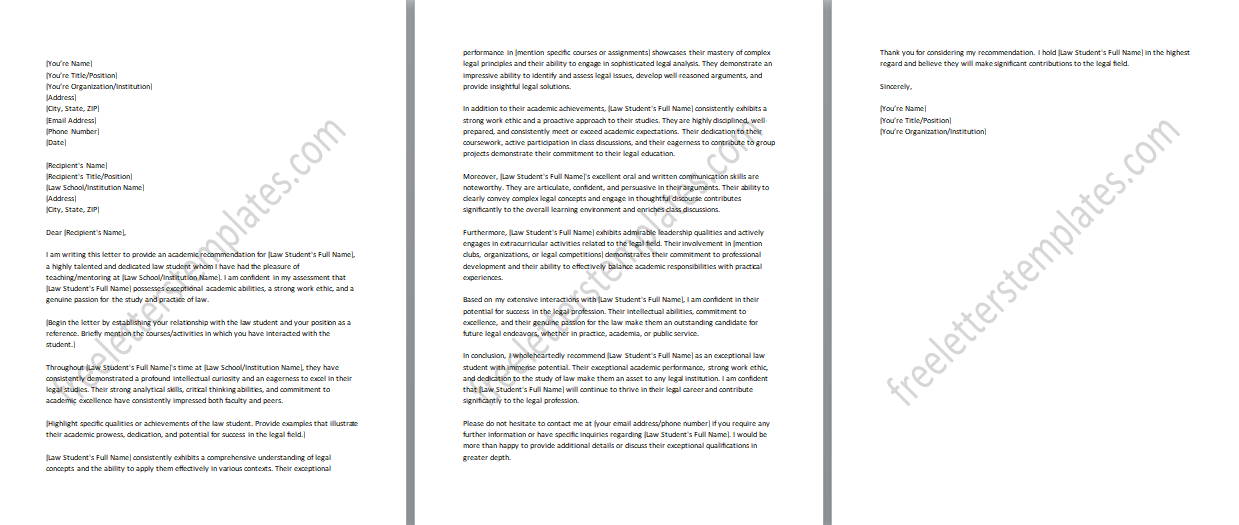
#5: Reference for a Competent Legal Secretary
A reference letter for a competent secretary serves as a valuable endorsement of their skills, professionalism, and contributions to the field. This letter is typically requested by prospective employers or legal organizations to assess the secretary’s qualifications and suitability for a legal secretary position. It highlights their ability to manage calendars, draft documents, maintain confidential information, and provide efficient support to professionals. The reference aims to convey the secretary’s reliability, adaptability, and commitment to delivering high-quality work. A well-crafted reference can significantly enhance the secretary’s chances of securing new employment opportunities and establishing a positive professional reputation in the field.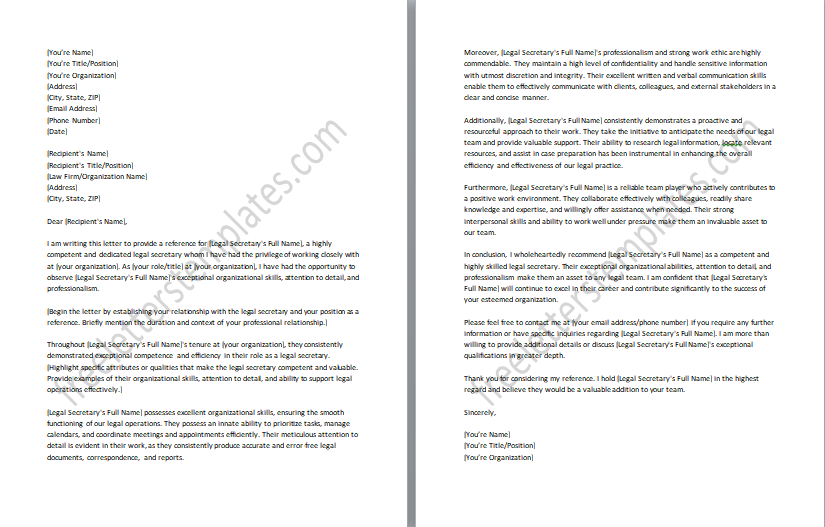
#6: Recommendation for a Reliable Legal Assistant
A recommendation letter for a reliable legal assistant serves as a testament to their professionalism, competence, and invaluable contributions in a setting. The purpose of this letter is to provide a comprehensive and objective evaluation of the assistant’s organizational skills, attention to detail, legal knowledge, and ability to handle complex tasks. It highlights their proficiency in research, document preparation, case management, and their strong work ethic. The recommendation aims to convey the assistant’s reliability, adaptability, and dedication to supporting professionals in their day-to-day activities. A well-crafted recommendation can significantly enhance the assistant’s chances of securing new employment opportunities and establishing a positive professional reputation in the field.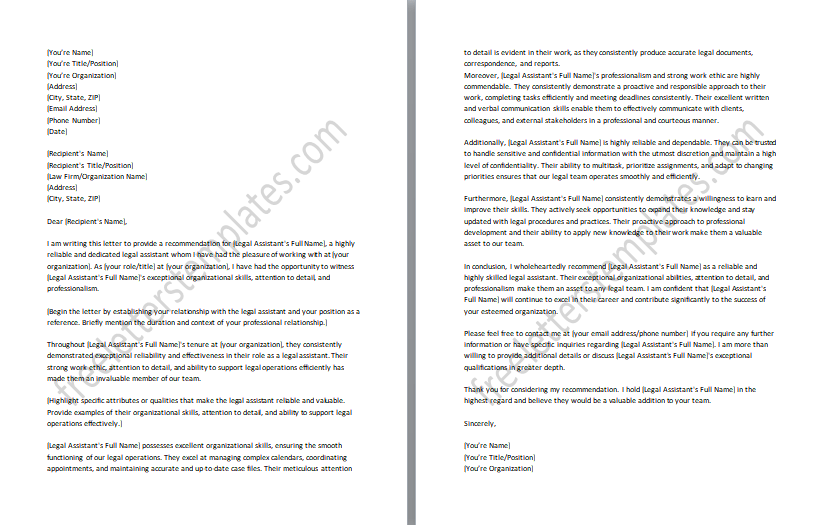
#7: Reference for a Diligent Legal Intern
A reference letter for diligent legal interns serves as a testament to their exceptional work ethic, dedication, and potential in the profession. It provides an objective evaluation of the intern’s performance, professionalism, research skills, and ability to handle legal tasks. The letter highlights their eagerness to learn, adaptability, and willingness to take on challenging assignments. It conveys the intern’s diligence, strong work ethic, and positive impact on the team. A well-crafted reference enhances the intern’s chances of securing future opportunities, such as employment or advanced education, and highlights their potential for success in the field.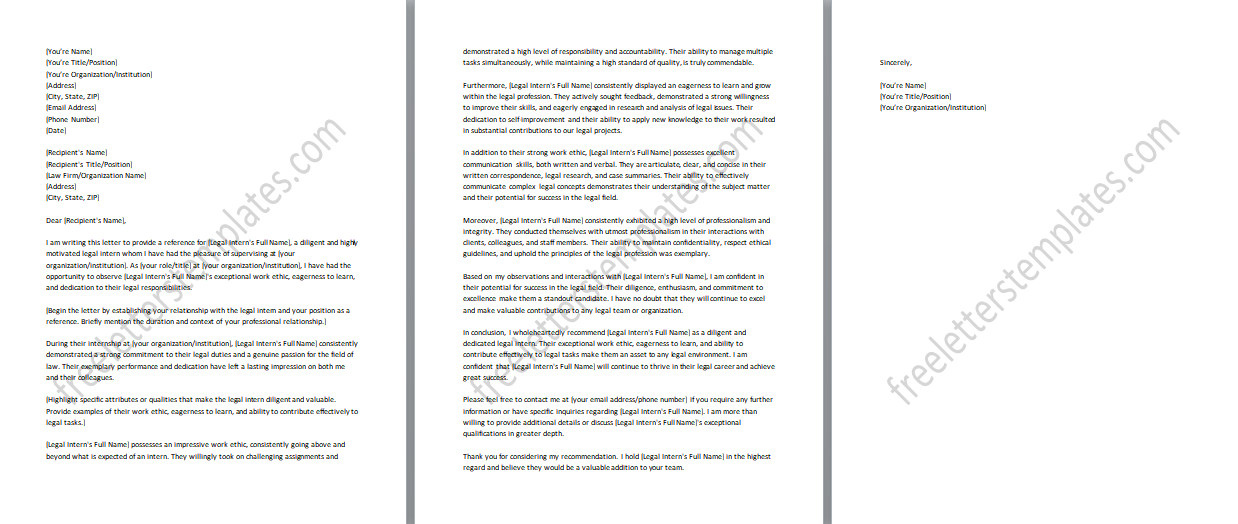
#8: Recommendation for an Experienced Legal Consultant
A recommendation letter for an experienced legal consultant serves as a powerful endorsement of their expertise, professionalism, and contributions to the field of law. This letter is typically requested by clients, legal firms, or organizations to assess the consultant’s qualifications and suitability for advisory roles. It highlights their track record of success, exceptional communication skills, and their ability to navigate complex issues. The recommendation aims to convey the consultant’s reliability, credibility, and significant contributions to the legal profession. A well-crafted recommendation can greatly enhance the consultant’s reputation, attract new clients, and foster professional opportunities in the consulting field.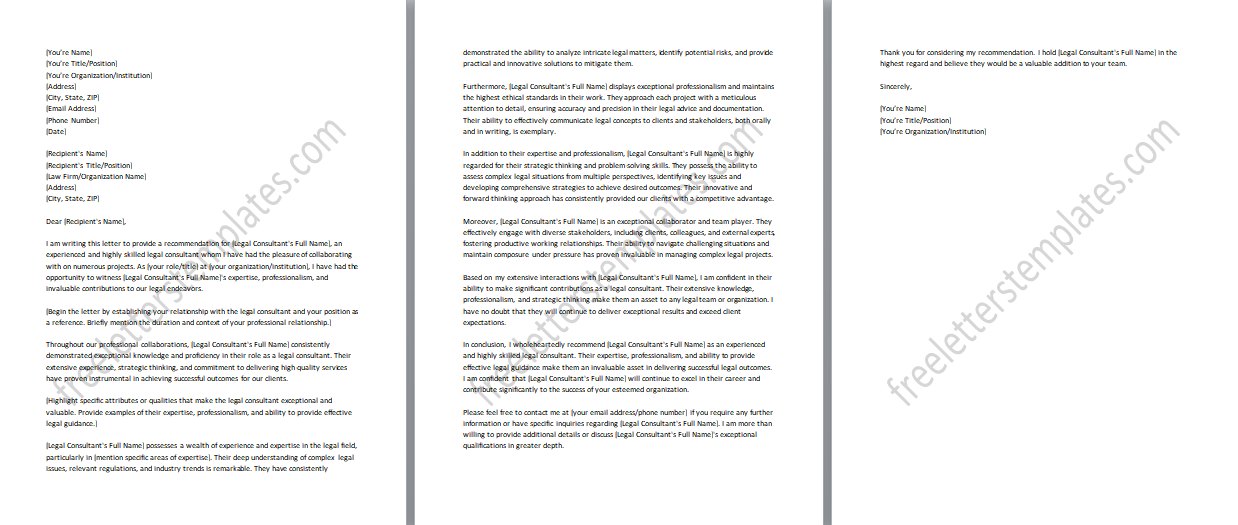
#9: Research Skills Reference for a Legal Researcher
A research skills reference letter for a legal researcher provides an objective evaluation of their expertise, meticulousness, and proficiency in conducting research. This letter is typically requested by academic institutions, legal organizations, or prospective employers to assess the researcher’s qualifications and suitability for research-focused roles. The reference emphasizes the researcher’s critical thinking skills, attention to detail, and ability to provide valuable insights that support decision-making. A well-crafted reference can significantly enhance the researcher’s chances of securing research positions, academic opportunities, or employment in a field where strong research skills are highly valued.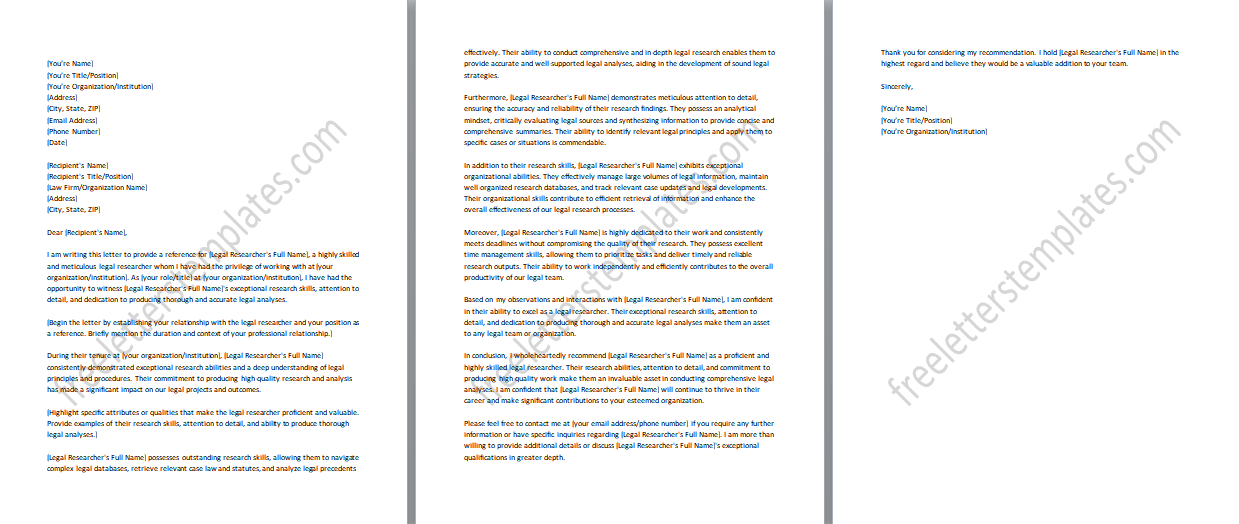
#10: Language Proficiency Recommendation for a Legal Translator
A language proficiency recommendation letter for a legal translator provides an endorsement of their exceptional language skills, accuracy, and professionalism. It highlights their fluency in multiple languages, command of legal terminology, and ability to accurately convey concepts across languages. The letter emphasizes their attention to detail, cultural sensitivity, and commitment to delivering high-quality translations. It showcases their ability to maintain the integrity and accuracy of the original documents. A well-crafted recommendation enhances the translator’s reputation, attracts new clients, and opens up professional opportunities in the translation field. It serves as a testament to their language proficiency and ensures potential clients of their reliability and capability as skilled translators.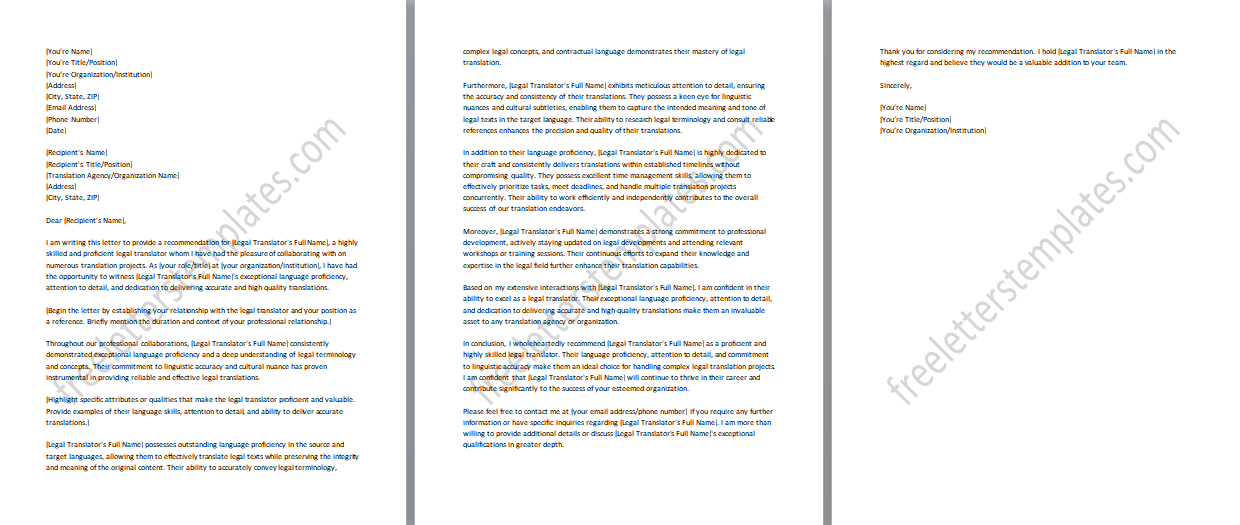
#11: Reference for a Thorough Legal Investigator
A reference letter for a thorough investigator provides an objective assessment of their skills, dedication, and effectiveness in conducting investigations. This is typically requested by law firms, legal departments, or organizations to evaluate the investigator’s qualifications and suitability for investigative roles. The reference letter emphasizes their strong interviewing skills, knowledge of procedures, and ability to uncover relevant information crucial to cases. A well-crafted reference can significantly enhance the investigator’s professional reputation, attract new clients, and open up opportunities in the legal field where thorough investigative skills are highly valued.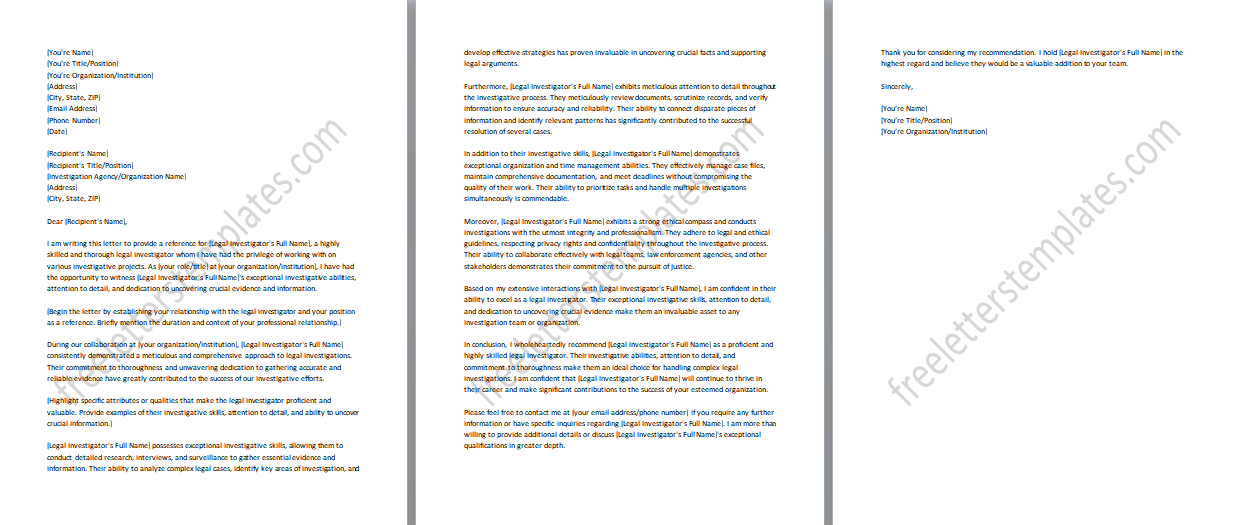
#12: Recommendation for a Trustworthy Bailiff
A recommendation letter for a trustworthy bailiff serves as a testament to their integrity, reliability, and professionalism in carrying out their duties within the legal system. This is typically requested by courts, law enforcement agencies, or legal professionals to assess the bailiff’s qualifications and suitability for their role. The recommendation highlights their exceptional judgment, attention to detail, and their commitment to upholding the principles of justice. A well-crafted recommendation letter can significantly enhance the bailiff’s professional reputation, reinforce public confidence in their abilities, and contribute to their career advancement within the field.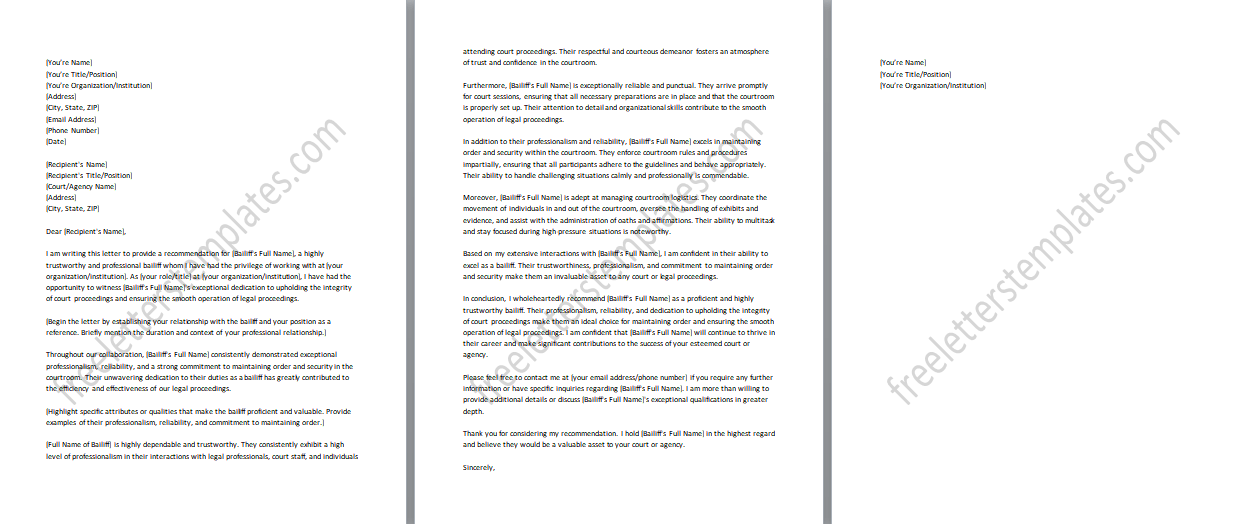
#13: Reference for an Organized Legal Clerk
A reference letter for an organized legal clerk provides an endorsement of their exceptional organizational skills, attention to detail, and efficiency in supporting operations. This is typically requested by law firms, legal departments, or organizations to evaluate the clerk’s qualifications and suitability for administrative roles within the field. The purpose of this letter is to highlight the clerk’s ability to manage documents, maintain accurate records, and handle administrative tasks with precision. The reference emphasizes their proficiency in research, drafting documents, scheduling, and their ability to prioritize tasks effectively. It also underscores their strong work ethic, reliability, and their commitment to providing valuable support to professionals. A well-crafted reference can significantly enhance the clerk’s professional reputation, attract new opportunities, and reinforce their role as highly organized and indispensable members of the team.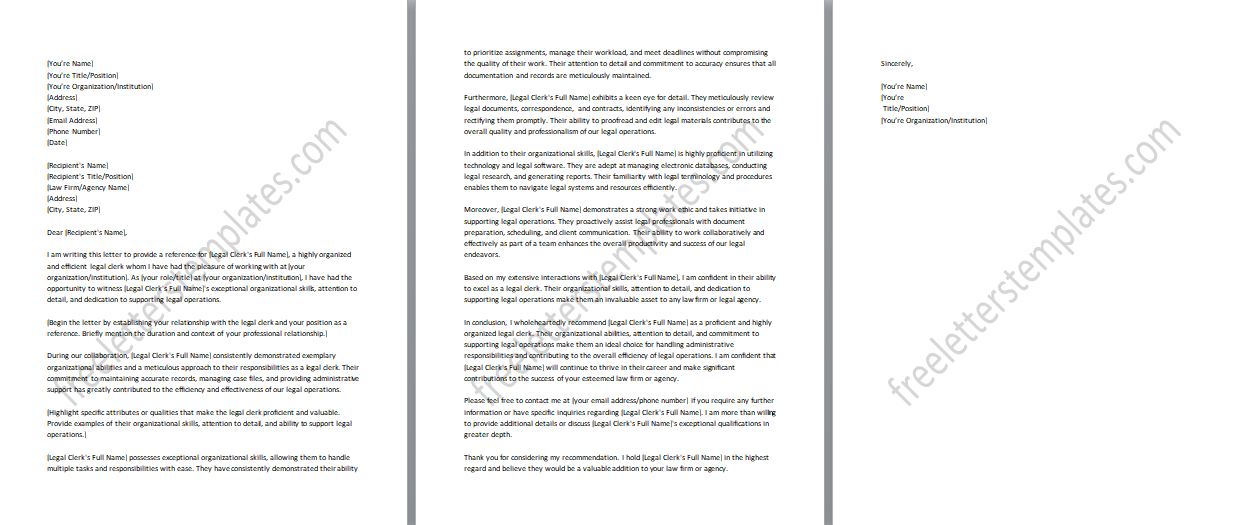
#14: Recommendation for a Competent Notary Public
A recommendation letter for a competent notary public provides an endorsement of their expertise, professionalism, and reliability in performing notarial services. This is typically requested by individuals, businesses, or legal entities to assess the notary public’s qualifications and suitability for notarizing documents. The purpose of this is to highlight the notary public’s knowledge of notarial laws, attention to detail, and ability to execute notarial acts accurately and efficiently. The recommendation letter emphasizes their adherence to ethical standards, their exceptional communication skills, and their commitment to providing exceptional customer service. A well-crafted recommendation can significantly enhance the notary public’s professional reputation, attract new clients, and reinforce their role as competent and trustworthy notarial professionals in the community.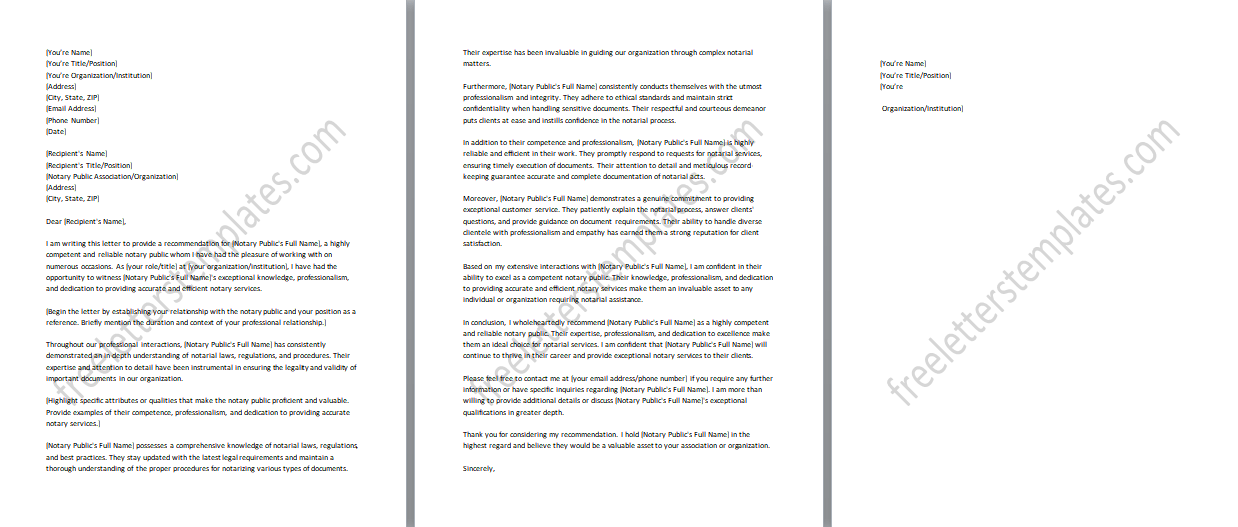
#15: Mediation Skills Reference for a Mediator
A mediation skills reference letter for a mediator provides an endorsement of their expertise, effectiveness, and professionalism in facilitating peaceful resolutions. It highlights their exceptional communication skills, active listening abilities, and ability to create a neutral and supportive environment. The letter emphasizes their impartiality, empathy, and aptitude for guiding parties toward mutually agreeable solutions. It showcases their commitment to fostering favorable resolutions and their ability to navigate complex conflicts with sensitivity and tact. A well-crafted reference enhances the mediator’s professional reputation, attracts new clients, and reinforces their role as skilled mediators in the legal field. It assures potential clients of their competence, effectiveness, and commitment to facilitating fair and constructive resolutions.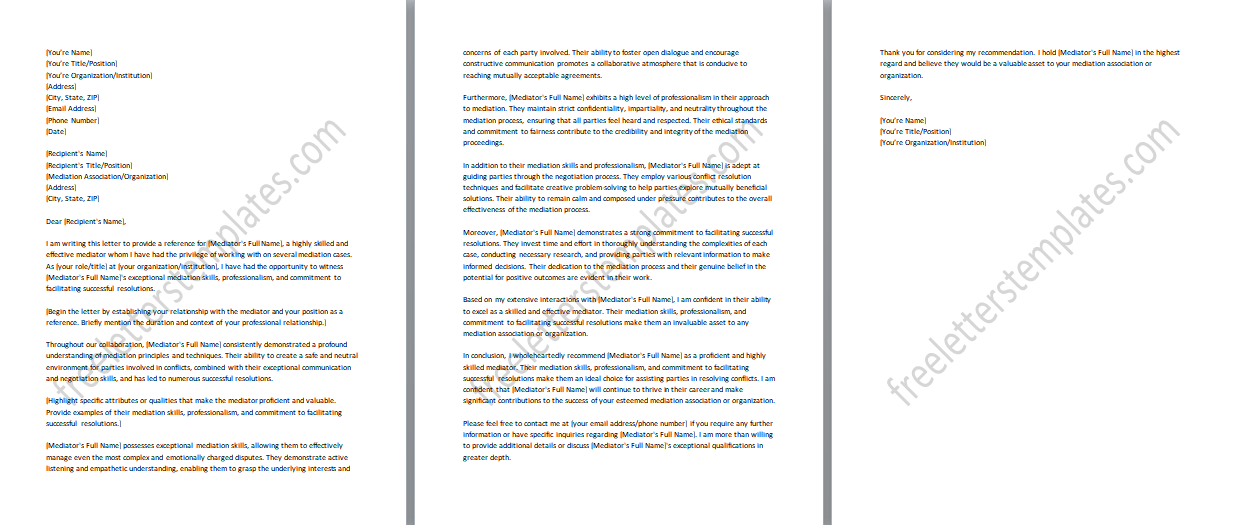
#16: Recommendation for an Efficient Legal Administrator
A recommendation letter for an efficient legal administrator provides an endorsement of their exceptional organizational skills, attention to detail, and effectiveness in managing operations. It highlights their ability to oversee and coordinate administrative tasks, such as document management, scheduling, and personnel coordination, with efficiency and accuracy. The letter emphasizes their strong problem-solving abilities, proficiency in legal software and systems, and commitment to streamlining processes for maximum efficiency. It showcases their professionalism, reliability, and dedication to supporting the smooth functioning of the team. A well-crafted recommendation enhances the administrator’s professional reputation, attracts new opportunities, and reinforces their role as a valuable asset in the field.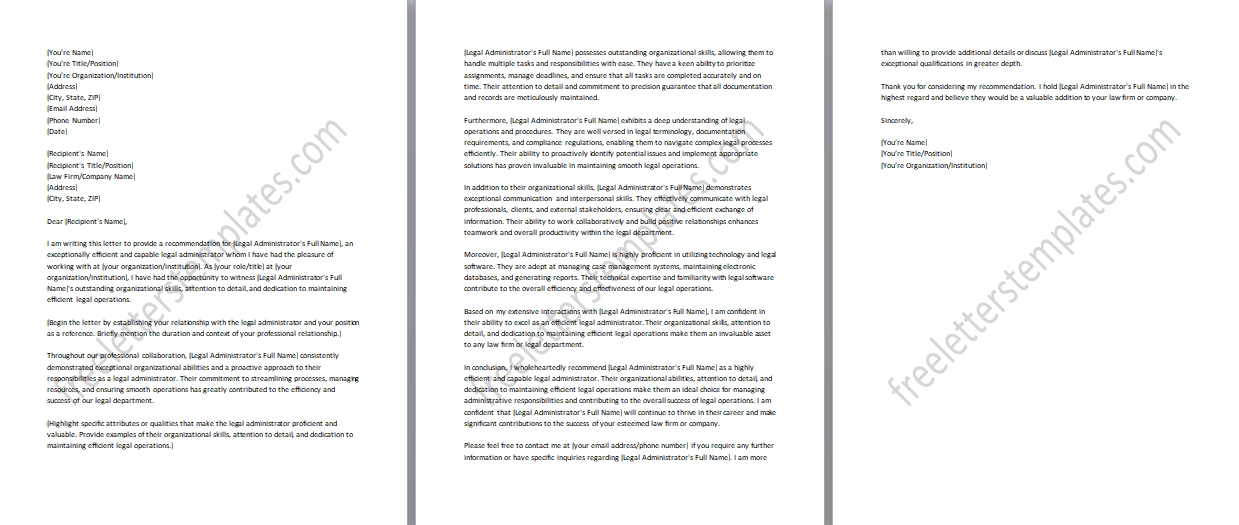
#17: Reference for a Trusted Legal Counsel
A reference letter for a trusted legal counsel serves as a testament to their expertise, integrity, and professionalism in providing advice and representation. This is typically requested by clients, legal firms, or organizations to assess the counsel’s qualifications and suitability for counsel positions. The reference letter highlights their ethical solid principles, their ability to navigate complex matters, and their track record of delivering favorable outcomes. It emphasizes their excellent communication skills, client-centered approach, and their commitment to upholding the highest standards of the profession. A well-crafted reference can significantly enhance the counsel’s professional reputation, attract new clients, and foster professional opportunities in the legal field.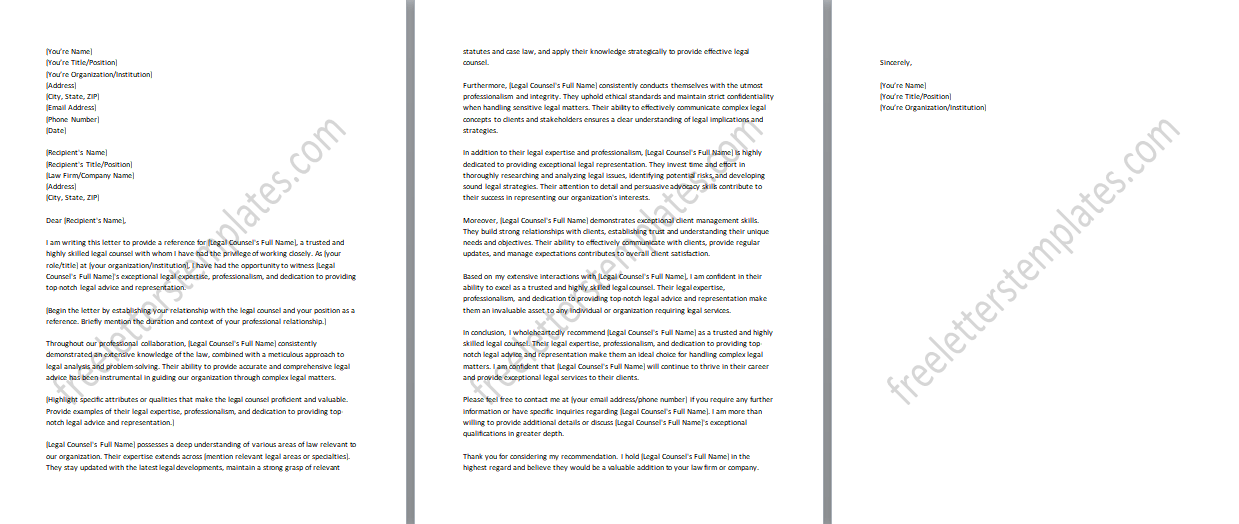
#18: Recommendation for a Dedicated Law Enforcement Officer
A recommendation letter for a dedicated law enforcement officer provides an endorsement of their commitment, professionalism, and exceptional service in maintaining public safety. It highlights their integrity, courage, and ability to handle challenging situations with tact and professionalism. It showcases their effective communication, collaboration, and sound judgment in high-pressure situations. A well-crafted recommendation enhances the officer’s professional reputation, reinforces their role as a respected law enforcement professional, and contributes to their career advancement within the field. It serves as a testament to their dedication, skills, and positive impact on the community they serve.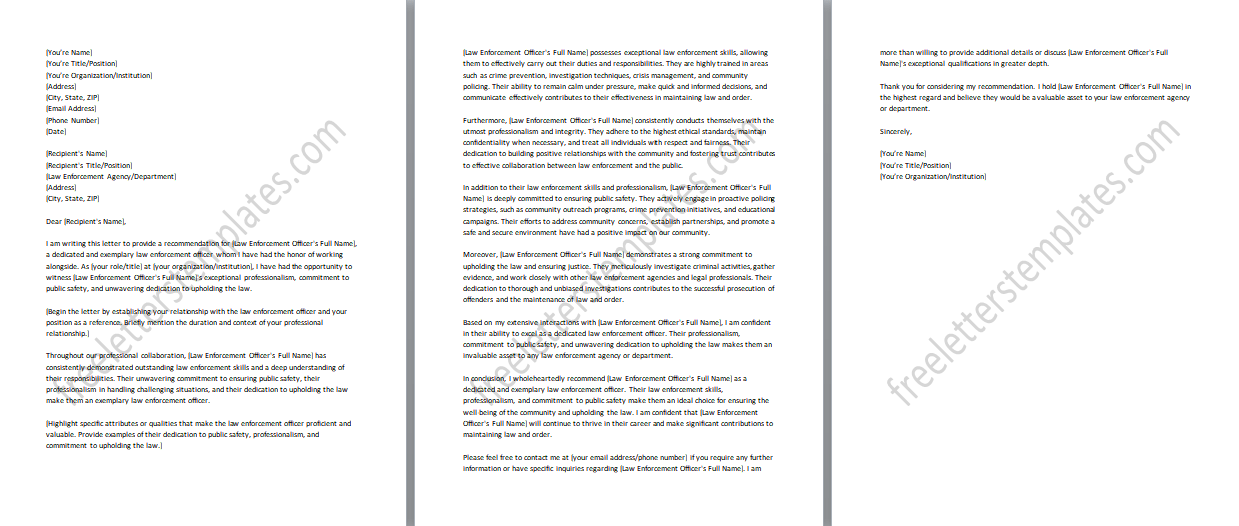
#19: Legal Compliance Officer Compliance Expertise Reference
A reference letter for a legal compliance officer with expertise in compliance provides an endorsement of their knowledge, skills, and effectiveness in ensuring regulatory compliance within organizations. This is typically requested by employers, regulatory bodies, or clients to evaluate the compliance officer’s qualifications and suitability for compliance roles. The reference emphasizes their attention to detail, analytical thinking, and commitment to upholding ethical standards and best practices in compliance. It also showcases their ability to provide guidance, training, and support to employees, fostering a culture of compliance within the organization. A well-crafted reference can significantly enhance the compliance officer’s professional reputation, attract new opportunities, and reinforce their role as a trusted expert in the field of compliance.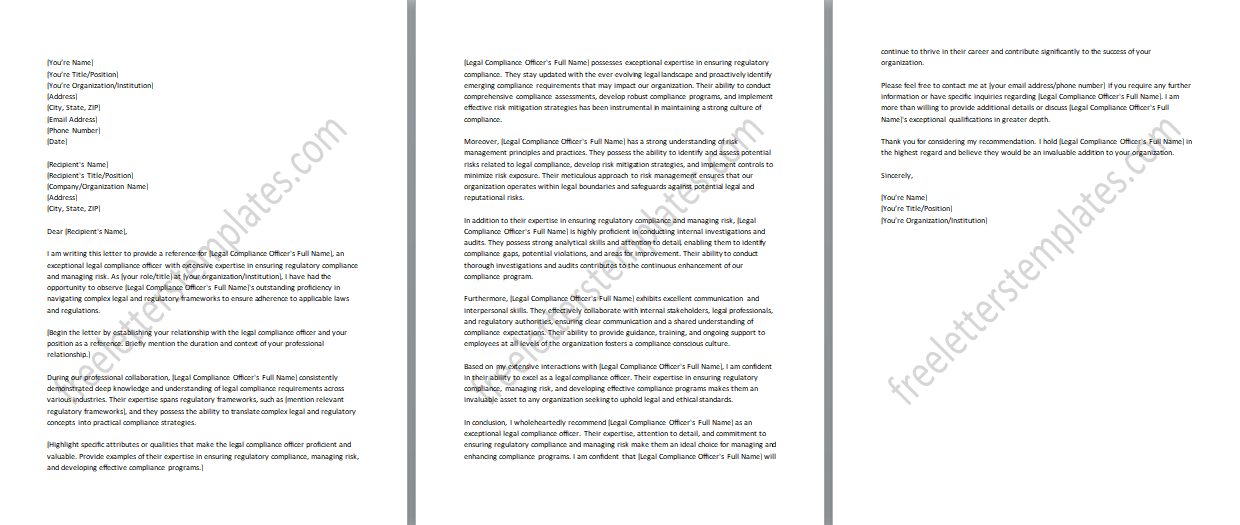
#20: Legal Ethics Recommendation for an Ethical Advisor
A recommendation letter for an ethical advisor specializing in legal ethics provides an endorsement of their expertise, integrity, and commitment to upholding ethical standards within the profession. This is typically requested by law firms, departments, or organizations to assess the advisor’s qualifications and suitability for providing ethical guidance and counsel. The recommendation letter emphasizes their strong moral compass, their commitment to maintaining confidentiality and professional integrity, and their ability to navigate challenging ethical situations with wisdom and discretion. A well-crafted recommendation can significantly enhance the advisor’s professional reputation, attract new clients, and reinforce their role as trusted and ethical advisors in the community.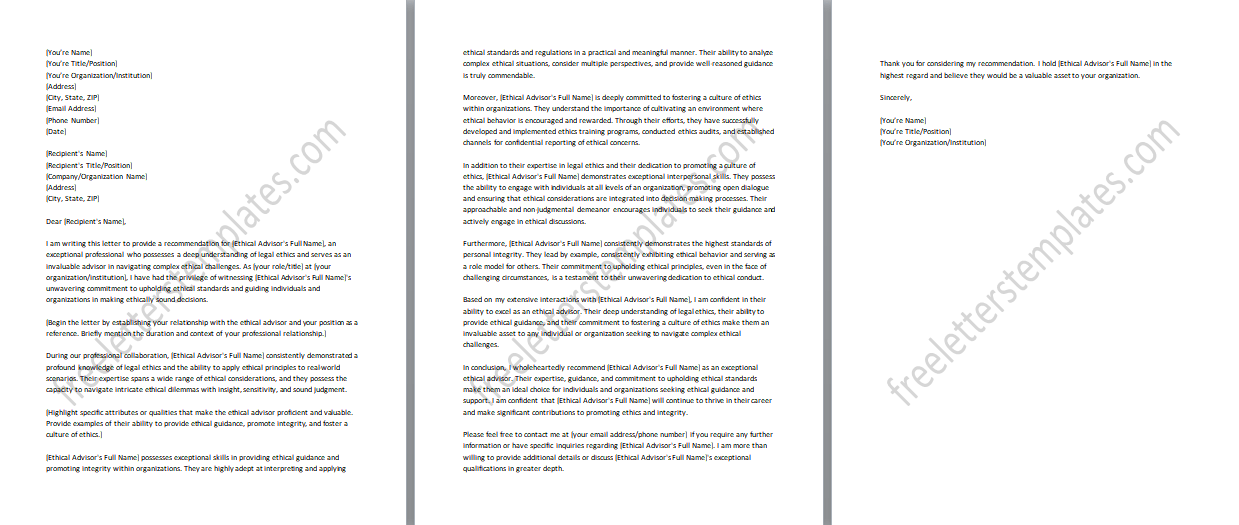
#21: Reference for a Dedicated Legal Advocate
A reference letter for a dedicated advocate provides an endorsement of their passion, commitment, and effectiveness in advocating for clients’ rights and interests. This is typically requested by clients, professionals, or organizations to assess the advocate’s qualifications and suitability for legal advocacy positions. The purpose of this is to highlight the advocate’s exceptional communication skills, analytical abilities, and ability to develop compelling arguments. The reference letter emphasizes their dedication to thorough research, their persuasive presentation skills, and their unwavering commitment to pursuing justice on behalf of their clients. It showcases their ability to navigate complex legal matters, their empathy toward clients, and their determination to achieve positive outcomes.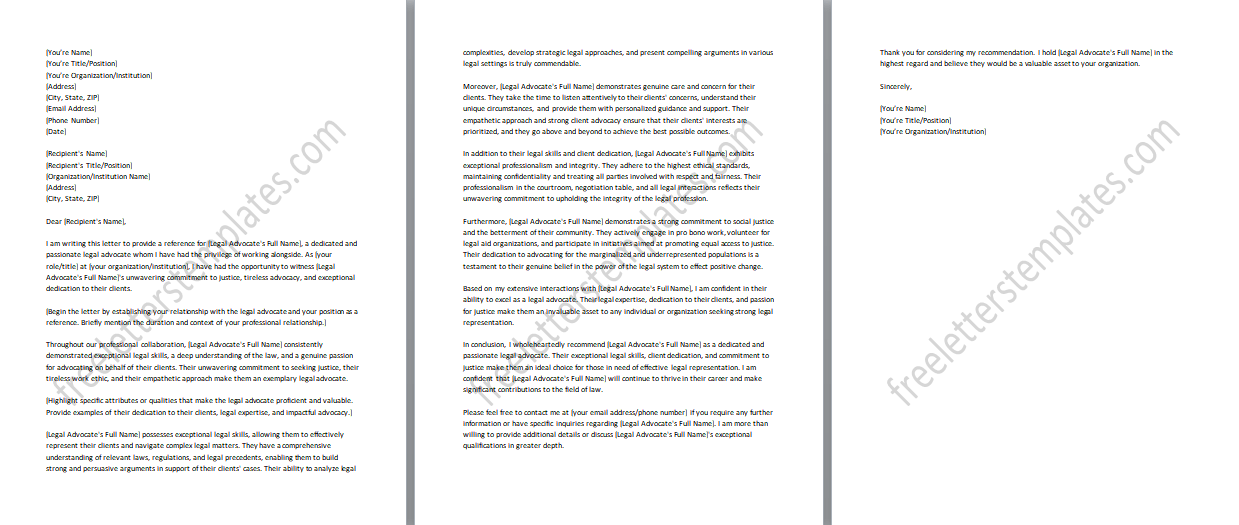
#22: Recommendation for a Valued Legal Aid Officer
A recommendation letter for a valued legal aid officer provides an endorsement of their exceptional dedication, compassion, and effectiveness in providing assistance to individuals in need. This is typically requested by aid organizations, supervisors, or community members to assess the officer’s qualifications and suitability for aid roles. The recommendation letter emphasizes their excellent communication skills, their resourcefulness in finding solutions, and their ability to empower clients to navigate the system. It showcases their professionalism, reliability, and their unwavering dedication to providing equal access to justice. A well-crafted recommendation can significantly enhance the officer’s professional reputation, attract funding and support for legal aid initiatives, and reinforce their role as a valued and impactful aid officer within the community.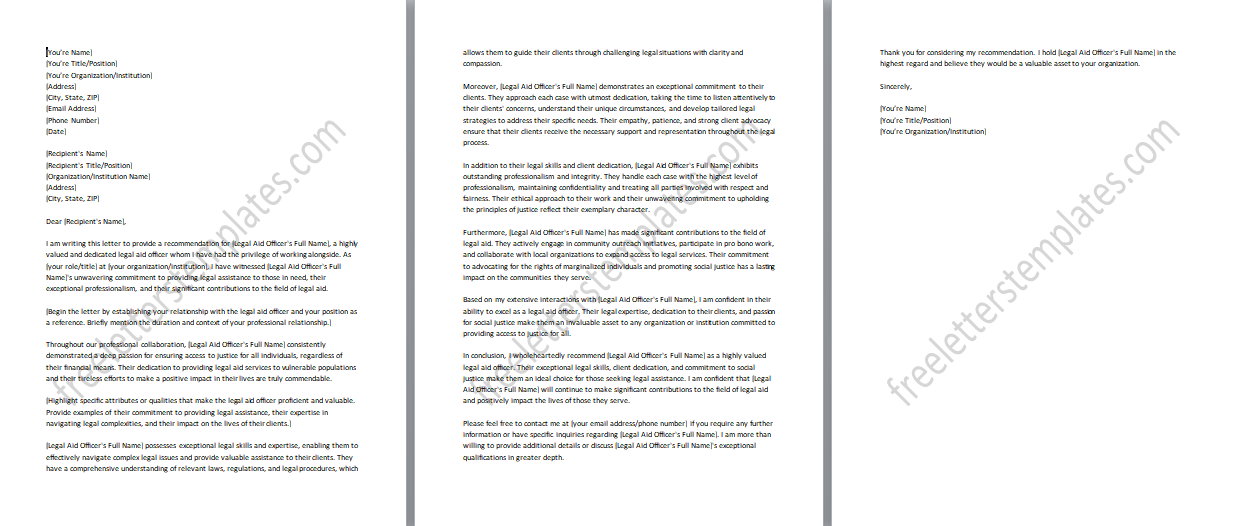
#23: Reference for a Committed Legal Clinic Volunteer
A reference letter for a committed legal clinic volunteer indicates their dedication, passion, and valuable contributions to providing legal services to underserved individuals. It highlights their commitment to social justice, willingness to learn and contribute, and ability to work effectively within a clinic environment. The emphasizes their excellent interpersonal skills, empathy towards clients, and reliability in fulfilling volunteer responsibilities. It showcases their ability to assist with research, document preparation, and client interviews, supporting the legal clinic’s mission. A well-crafted reference letter enhances the volunteer’s professional reputation, opens doors to further opportunities in the field, and highlights their role as a valuable and committed clinic volunteer making a positive impact in the community.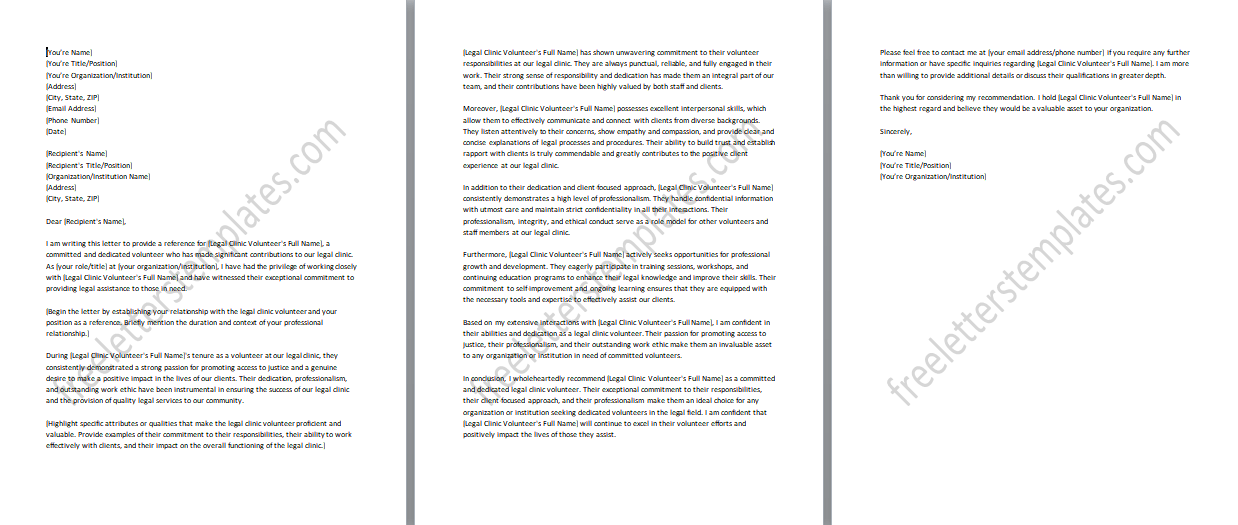
#24: Legal Ethics Committee Member Recommendation
A recommendation letter for a legal ethics committee member provides an endorsement of their expertise, integrity, and commitment to upholding ethical standards within the legal profession. This is typically requested by organizations, regulatory bodies, or professional associations to evaluate the committee member’s qualifications and suitability for their role. The recommendation letter emphasizes their strong ethical compass, their fair and impartial judgment, and their contributions to the development and enforcement of ethical standards. It also showcases their professionalism, leadership skills, and their ability to collaborate effectively with other committee members. A well-crafted recommendation can significantly enhance the committee member’s professional reputation, reinforce their role as a respected ethical authority, and contribute to their continued service in the ethics field.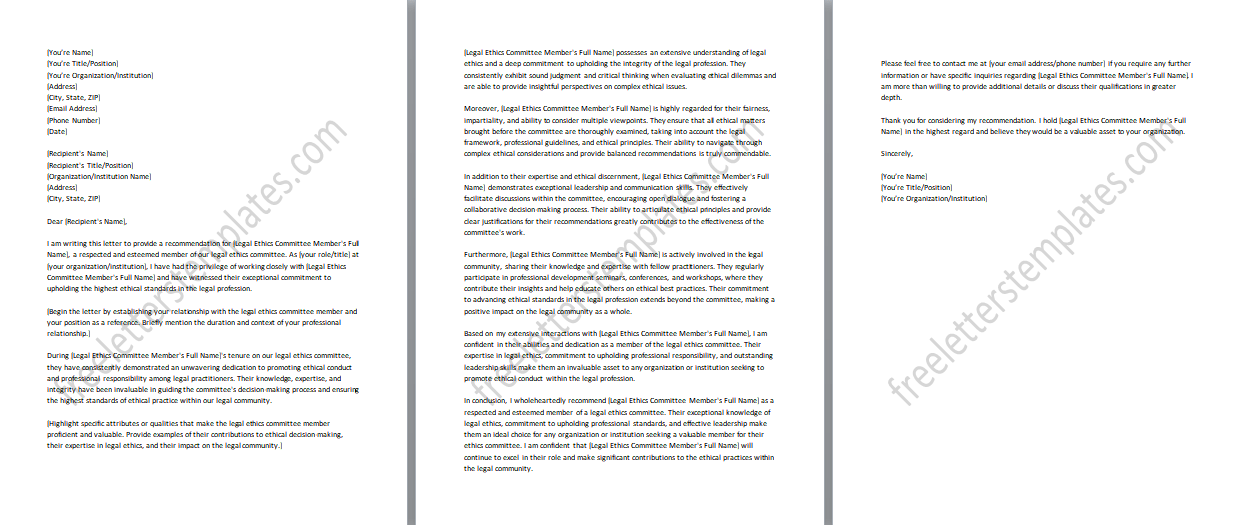
#25: Reference for an Accomplished Legal Education Administrator
A reference letter for an accomplished legal education administrator provides an endorsement of their exceptional leadership, expertise, and contributions to managing and enhancing education programs. It highlights their strategic vision, innovative initiatives, and dedication to creating a supportive and inclusive learning environment. The letter emphasizes their strong organizational skills, effective communication with faculty and students, and commitment to academic excellence. It showcases their successful track record in program development, curriculum design, and student engagement. A well-crafted reference enhances the administrator’s professional reputation, attracts talented faculty and students, and reinforces their role as accomplished and respected legal education administrators within the academic community.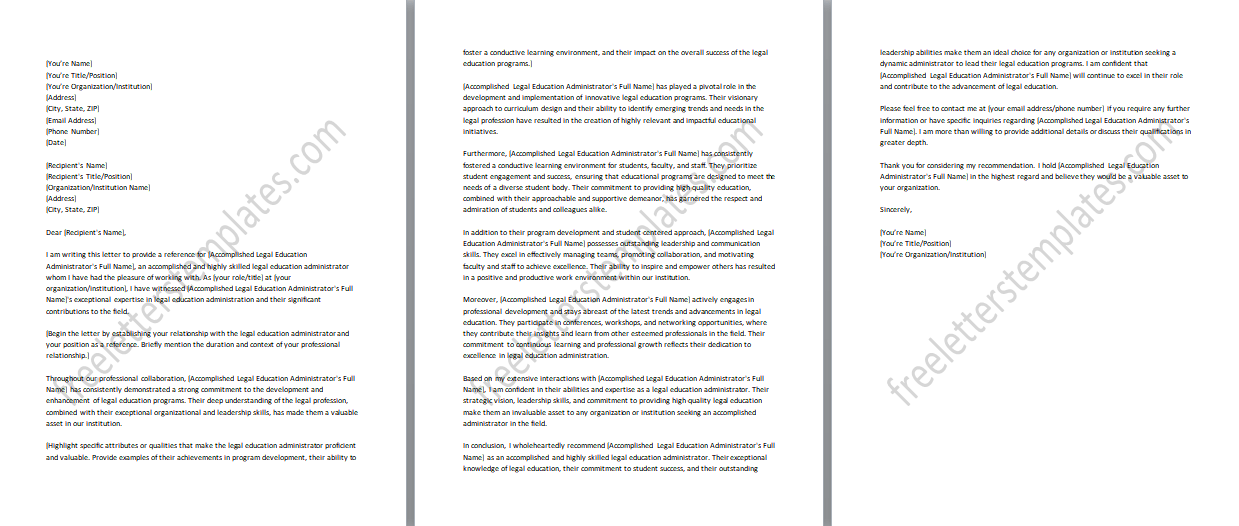
#26: Recommendation for a Distinguished Legal Scholar
A recommendation letter for a distinguished legal scholar is an endorsement of their outstanding expertise, research contributions, and academic achievements in law. This is typically requested by academic institutions, colleagues, or professional associations to evaluate the scholar’s qualifications and suitability for prestigious academic positions or recognition. The purpose of this is to highlight the scholar’s exceptional knowledge, analytical skills, and original research in their specialized area of law. The recommendation letter emphasizes their significant contributions to legal scholarship, their published works, and their impact on the field. It showcases their intellectual rigor, critical thinking abilities, and their ability to mentor and inspire future scholars.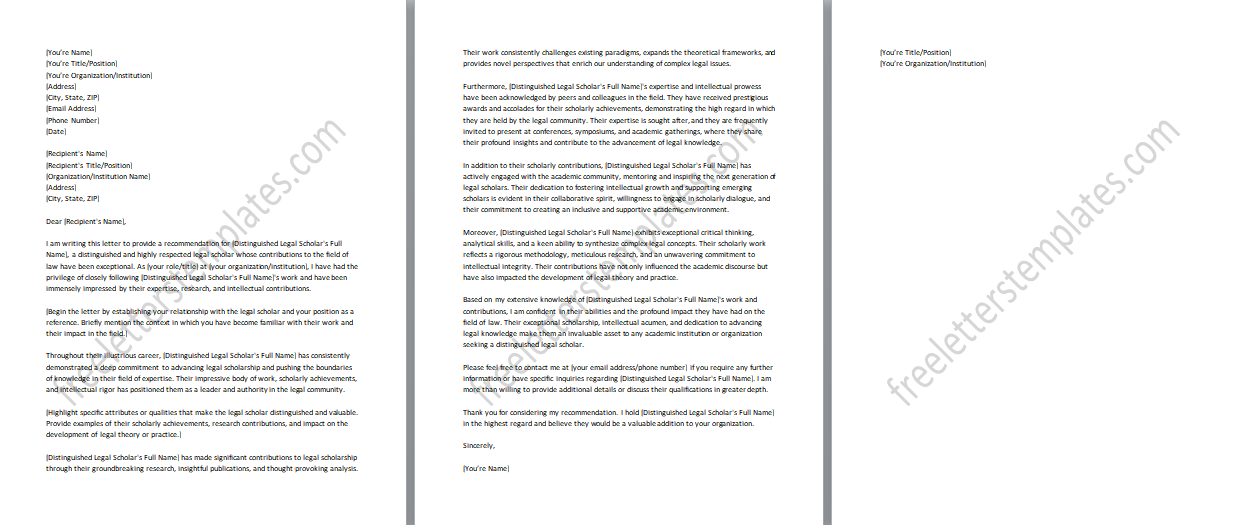
Language and Tone
- Be concise: Use clear and concise language to convey your message effectively. Avoid unnecessary jargon or overly complex terms that may confuse the reader.
- Focus on facts and achievements: Provide specific examples and concrete evidence of the individual’s skills, accomplishments, and contributions. Avoid generalizations and unsupported statements.
- Avoid exaggeration: While it’s important to highlight the individual’s strengths, avoid excessive exaggeration or hyperbole. Stick to the facts and present an honest and realistic assessment.
- Use positive and supportive language: Maintain a positive tone throughout the letter, emphasizing the individual’s strengths and positive qualities. Offer support and encouragement for their future endeavors.
- Provide a balanced perspective: While it’s important to highlight the individual’s strengths, it’s also important to provide a balanced assessment. Acknowledge areas for growth or improvement, if applicable, while focusing on their overall competence and potential.
- Maintain professionalism: Remember that reflects not only the individual you are recommending but also your own professionalism. Use appropriate language, avoid personal biases, and present a fair and objective assessment.
- Proofread for clarity and tone: After writing the letter, proofread it carefully to ensure that the language and tone align with your intended message. Check for any errors or inconsistencies that may affect the overall tone of the letter.
Proofreading and Editing
- Check for accuracy: Review the content of the letter to ensure that all information provided is accurate and factual. Double-check names, dates, job titles, and any other details mentioned in the letter.
- Grammar and spelling: Carefully proofread the letter for grammatical errors, punctuation mistakes, and spelling errors. Use spell-check tools, but also read the letter aloud to catch any errors that automated tools may miss.
- Clarity and conciseness: Make sure that the language used in the letter is clear and easy to understand. Avoid using overly complex or convoluted sentences. Simplify the language where possible to enhance clarity.
- Remove unnecessary information: Review the letter to identify any redundant or irrelevant information. Trim down the content to focus on the most important points that highlight the individual’s qualifications and strengths.
- Check formatting and structure: Ensure that the follows proper formatting guidelines and has a logical structure. Use paragraphs and headings to organize the content effectively.
- Seek feedback: Consider asking a trusted colleague, mentor, or friend to review the letter and provide feedback. Another set of eyes can help identify any areas that may need improvement.
- Read it aloud: Read them aloud to yourself to identify any awkward phrasing, unclear sentences, or areas that may need revision. This can help you identify areas where the language can be improved.
- Proofread multiple times: Proofread the letter multiple times to catch any errors or inconsistencies that may have been missed in earlier readings. Take breaks between proofreading sessions to maintain a fresh perspective.
Concluding Thoughts
In conclusion, the “Legal Reference Letters” website serves as a comprehensive resource, offering valuable insights, guidance, and tips for creating effective and professional legal references. From selecting appropriate referees to writing with clarity and precision, the website provides practical advice on language and tone, proofreading and editing, and optimizing the content for maximum impact. Whether you are seeking a reference or are tasked with writing one, this website equips you with the knowledge and tools to navigate the process successfully, ensuring that your letters accurately represent the qualifications, skills, and achievements of the individuals involved. By utilizing the resources provided, you can confidently craft compelling references that make a positive and lasting impression.